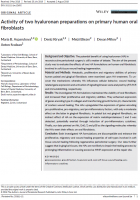Activity of Two Hyaluronan Preparations on Primary Human Fibroblasts
Background and Objective: The potential benefit of using hyaluronan (HA) in
reconstructive periodontal surgery is still a matter of debate. The aim of the present
study was to evaluate the effects of two HA formulations on human oral fibroblasts
involved in soft tissue wound healing/regeneration.
Material and Methods: Metabolic, proliferative and migratory abilities of primary
human palatal and gingival fibroblasts were examined upon HA treatment. To uncover
the mechanisms whereby HA influences cellular behavior, wound healing-related
gene expression and activation of signaling kinases were analyzed by qRT-PCR
and immunoblotting, respectively.
Results: The investigated HA formulations maintained the viability of oral fibroblasts
and increased their proliferative and migratory abilities. They enhanced expression
of genes encoding type III collagen and transforming growth factor-β3,
characteristic
of scarless wound healing. The HAs upregulated the expression of genes encoding
pro-proliferative,
pro-migratory,
and pro-inflammatory
factors, with only a moderate
effect on the latter in gingival fibroblasts. In palatal but not gingival fibroblasts, an
indirect effect of HA on the expression of matrix metalloproteinases 2 and 3 was
detected, potentially exerted through induction of pro-inflammatory
cytokines.
Finally, our data pointed on Akt, Erk1/2 and p38 as the signaling molecules whereby
the HAs exert their effects on oral fibroblasts.
Conclusion: Both investigated HA formulations are biocompatible and enhance the
proliferative, migratory and wound healing properties of cell types involved in soft
tissue wound healing following regenerative periodontal surgery. Our data further
suggest that in gingival tissues, the HAs are not likely to impair the healing process by
prolonging inflammation or causing excessive MMP expression at the repair site.

